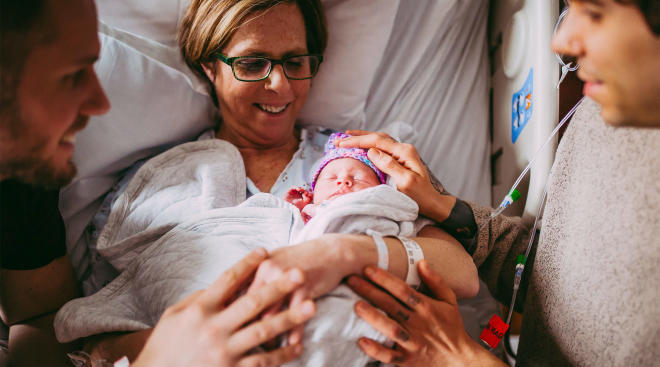Finding a Surrogate Mother: How to Navigate the Surrogacy Process
When it comes to expanding a family, the path that leads to hiring a surrogate mother—having someone else carry and birth your child—is typically long and fraught with emotion.
With a few exceptions, the surrogacy process isn’t the first nor easiest method of choice for most families. Many women seek surrogacy because of medical complications: They’ve had their uterus removed, their uterus doesn’t function or they have a condition that makes pregnancy too risky. “Sometimes people have failed multiple IVF cycles and can’t figure out why—they’re like Teflon and the embryo just won’t stick,” says Valerie Baker, MD, TeLinde-Wallach professor of gynecology and obstetrics at Johns Hopkins University School of Medicine and director of the Hopkins Division of Reproductive Endocrinology and Infertility.
Even with all its medical, legal and psychological risks, surrogacy can be a godsend to these families and to same-sex couples and single male parents who want to parent their own biological child. So how does surrogacy work, and what are the financial, legal and logistical considerations to keep in mind? Read on.
A woman who agrees to bear a child for another person or couple—usually supported by a legal agreement—is a surrogate mother. While there are a few different ways to achieve surrogacy, the most commonly practiced and legally sound is compensated gestational surrogacy, when a woman carries a child to whom she is not genetically related in exchange for a fee. The intended parents become legal guardians immediately following birth. The Society for Assisted Reproductive Technology estimates that in the US, out of all cycles of in vitro fertilization (IVF) in 2018, 2 to 2.5 percent—about 7,371—were carried out with a gestational carrier.
All but four states in the US recognize some type of compensated gestational surrogacy (Arizona, Louisiana, Michigan and Nebraska prohibit commercial surrogacy contracts), but the laws and terminology vary depending on where you are. The types of surrogate pregnancies—some legal, some not—you’re likely to hear about include:
• Gestational surrogacy: A gestational carrier is a woman who agrees to have an embryo implanted in her uterus, then carries the pregnancy for another person or couple who intends to adopt the child at birth. Because the carrier doesn’t provide the egg, she’s not genetically related to the baby.
• Traditional surrogacy: With a traditional surrogacy, the surrogate mother provides the egg, which means she’s the biological mother of the baby she bears. She gets inseminated with sperm or a fertilized egg from the intended father or donor. Due to the potentially messy legal situations that can arise if a traditional surrogate mother changes her mind and decides to claim parentage, traditional surrogacy isn’t legally permitted in most places.
• Commercial surrogacy: Commercial or compensated surrogacy is any arrangement in which the surrogate mother is paid for her services beyond reimbursement for medical expenses.
• Altruistic surrogacy: Mostly occurring between close family members and friends, an altruistic surrogacy is when a woman volunteers to carry a pregnancy to term without requesting or receiving any payment.
• Agency surrogacy: Think of a surrogacy agency as a one-stop shop: For a hefty fee, agencies match you with potential gestational carriers, link you up with IVF clinics, coordinate legal parentage paperwork and help foster the relationship between intended parents and their carrier from conception to birth.
• Independent surrogacy: Intended parents who decide not to use a surrogacy agency manage everything themselves, including finding their gestational carrier and IVF clinic, working directly with their own lawyer and helping the surrogate through the course of the pregnancy process.
There aren’t any federal guidelines for surrogacy best practices, but the American Society for Reproductive Medicine offers recommendations on what to look for in a surrogate mother. Optimally, she should:
- Be between the ages of 21 and 42
- Have delivered a liveborn child at term, so she knows what to expect when pregnant
- Have had a health screening that identifies any underlying medical conditions that might complicate a pregnancy
Most health care professionals working in IVF call for even stricter guidelines, although the pool of surrogate mothers isn’t that big. “What the ideal is and what we ultimately accept are two different things,” says Briana Rudick, MD, director of third party reproduction at Columbia University Fertility Center. Carriers who are under 35 years old are ideal, she says, as is someone who has a healthy lifestyle and has had no more than one c-section—all factors that mitigate some of the obstetric risks that come with older age.
“BMI is a huge factor—32 or below,” says Nicole Renslow, senior manager of surrogate recruiting and matching at Creative Family Connections, a gestational surrogate agency based in the Washington, DC, area. “She should also be financially stable and not dependent on any form of government assistance.” This is to protect the surrogate mother, says Renslow, noting that the compensation that gestational carriers typically receive for carrying a baby would disqualify them for getting financial aid programs.
There aren’t many physical requirements for intended parents, but Rudick says that they should have some type of mental health expert on hand to help them through the surrogacy process, which is almost always emotionally charged.
The surrogacy process can span anywhere from 18 months to 2.5 years depending on your situation, says Renslow. For families who need an egg donor—such as same-sex male couples, single males, older women with age-related fertility decline and women with ovarian insufficiency—the first step is to find one through a fertility clinic and determine how the embryos are going to be created. Then you’ll need to choose a surrogate mother. If you don’t have someone already in mind, you can pay a surrogacy agency to help.
The agency ensures that the carrier goes through a rigorous medical evaluation and psychological screening to be sure she’s making a decision that suits her best interests, says Baker.
Then it’s time to draw up the legal documents. Considerations like number of embryos to be transferred, fees for the carrier, parental rights, decisions on when and why to terminate the pregnancy and what happens during the birth should be finalized by two lawyers: One for the intended parents and one for the surrogate mother.
Once the paperwork is done, the medical processes begin. When creating embryos, you’re usually using ones that have been frozen and then screened for viability via pre-implantation genetic testing. The embryo transfer process takes about three to five weeks, says Rudick. Your IVF clinic sends the embryos to wherever your carrier is located, and doctors implant them into her uterus. “Nine days after transfer, the carrier takes a pregnancy test; she has an ultrasound about two weeks after the first positive test and then again at four weeks,” says Rudick. If everything looks good then, the gestational carrier moves on to her own ob-gyn.
How the relationship between intended parents and their surrogate mother goes during pregnancy and birth should be well outlined in the legal agreement. Prior to the COVID-19 pandemic, it wasn’t unusual to have intended parents attend ultrasounds and be in the delivery room for the birth." Things have changed with tighter rules today, says Rudick.
Prices vary depending on location and individual arrangements, but using a surrogate mother is an expensive endeavor. Some agencies estimate the low end of the range starts around $90,000. However, given the base fee for the surrogate mother, health screening costs, legal fees, insurance premiums and other payments for things like c-sections, lost wages, childcare costs for the carrier, twin/triplet births and number of embryos transfer attempts, intended parents may end up paying upwards of $140,000 to hire a gestational carrier, says Renslow.
The legality of having a baby via surrogacy—being able to enforce a contract between intended parents and a surrogate mother—is all over the map. Some states have no relevant surrogacy laws at all and you may be able to practice surrogacy there because there isn’t a case or statute that says you can’t," says Jennifer Ahern McGill, director of legal services and gestational surrogacy for Creative Family Connections. "For states that do have case law or statutes, they may only speak to certain surrogacy topics like requirements for contracts or establishing parentage. Some provide a comprehensive protocol to follow, and some limit surrogacy to married couples.”
Traditional surrogacy is practiced in states where no statute or published case law prohibits it. Most states permit gestational surrogacy, but the legal framework is complex and can vary depending on which county intended parents live in. One of the most lenient states is California, where intended parents can receive legal parental status before the birth of the child and there are no limitations on who can be a surrogate. That contrasts with Arizona, where surrogacy contracts are prohibited by statute.
Not hiring a lawyer isn’t an option. Intended parents and the surrogate mother should each have their own, says Baker. Often, the surrogate lives in a different state than the intended parents, and lawyers should be well-versed in the laws in both places. The main point of a surrogacy contract is to establish the rightful parents of the baby and how and when the parental rights take place—before or after birth.
The list of other concerns that a surrogacy contract might address is long, and can include:
- What medical costs will the intended parents pay for and how will payments be structured?
- How many embryos will the intended parents transfer to the surrogate?
- What genetic testing will be done?
- Course of action for anomalies that arise during pregnancy
- What would determine a termination of the pregnancy?
- Will the surrogate get a COVID-19 vaccine?
- In the event of a physician-ordered bed rest for a surrogate who is employed, what type of compensation for lost wages will the intended parents pay?
- Visitation rights during the pregnancy and birth
- What happens on the day of birth?
Some intended parents are lucky enough to have a family member or friend lined up to be their surrogate mother. For most, though, seeking a gestational carrier without the help of a surrogacy agency—chasing leads down via the internet—can be overwhelming. “I wouldn’t advise it,” says Baker. “There are a limited number of women who are willing to serve as a gestational carrier and who remain good candidates after medical screening."
Although you’ll pay a hefty fee to work with an agency, a reputable one handles all the complicated work. Less than 2 percent of the women who apply to be surrogate mothers with Creative Family Connections pass all screening processes, which include medical and psychological evaluations, background and reference checks and home visits to help evaluate personality, lifestyle and the environment in which your baby will be carried, says Renslow.
Once you’re signed on with an agency, think of it like a matching service. “So much goes into matching, making sure people are sympathetic to those big issues like termination and genetic testing,” says McGill. “We try really hard to get to know the intended parents at a foundational level so we can maximize the chances of a good relationship between the parents and carrier.”
About the experts:
Valerie Baker, MD, is a professor of gynecology and obstetrics at Johns Hopkins University School of Medicine and director of the school’s Division of Reproductive Endocrinology and Infertility. She also serves as president of the Society for Assisted Reproductive Technology as well as an associate editor for the American Journal of Obstetrics and Gynecology. Baker received her medical degree from Harvard Medical School and a master’s degree in public policy from the John F. Kennedy School of Government at Harvard University. She completed residency in obstetrics and gynecology and fellowship in reproductive endocrinology and infertility at the University of California, San Francisco.
Briana Rudick, MD, is director of Columbia University Fertility Center’s Third Party Reproduction Program and assistant professor of obstetrics and gynecology at Columbia University Medical Center. After completing her residency at the University of Pennsylvania, she completed a fellowship in reproductive endocrinology and infertility at the University of Southern California in Los Angeles.
Nicole Renslow is the senior manager of surrogate recruiting and matching at Creative Family Connections, a gestational surrogate agency based in the Washington DC area. Renslow reviews surrogate applications, speaks to surrogate candidates and references and performs gestational surrogates’ in-home visits.
Jennifer Ahern McGill is the director of legal services and gestational surrogacy for Creative Family Connections. She earned her law degree from Western Michigan University’s Cooley Law School in Lansing, Michigan, in 2009. McGill drafts and negotiates contracts, assists with court filings and petitions, represents Creative Family Connections clients in court and provides ongoing legal research.
Please note: The Bump and the materials and information it contains are not intended to, and do not constitute, medical or other health advice or diagnosis and should not be used as such. You should always consult with a qualified physician or health professional about your specific circumstances.
Navigate forward to interact with the calendar and select a date. Press the question mark key to get the keyboard shortcuts for changing dates.




















































